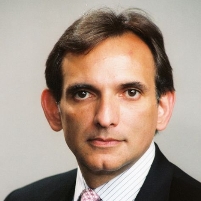U.S. Ambassador to Mexico: Who Is Carlos Pascual?
Wednesday, May 13, 2009

In April 2009, President Obama proposed Carlos Pascual as the next U.S. Ambassador to Mexico. This was a controversial choice because his specialty is not Latin America, but rather converting newly independent or failed states to democracy and free market capitalism.
Born in 1959 in Cuba, Pascual emigrated to the United States with his parents at the age of three. He earned his B.A. from Stanford University in 1980 and his Masters in Public Policy from the Kennedy School of Government at Harvard University in 1982.
Pascual joined the US Agency for International Development (USAID) in 1983. In addition to working at the agency’s Africa Bureau in Washington, DC, Pascual was posted to Sudan, South Africa and Mozambique. In June 1992, Pascual became director of USAID’s Office of Program Analysis and Coordination for the New Independent States Task Force. From February 1994 to June 1995 he was deputy assistant administrator for Europe and the New Independent States. In that position, he oversaw budget and policy development for USAID’s annual programs of $1.2 billion in the region.
In June 1995, Pascual left USAID for the National Security Council (NSC), where for three years he was director for Russian, Ukrainian and Eurasian Affairs, responsible for economic policy generally and for Ukraine, Moldova, and Belarus. From July 1998 to January 2000, Pascual served as special assistant to the President and NSC senior director for Russia, Ukraine, and Eurasia, where he guided US policy related to democracy and market change in Ukraine, and stability, security, and democracy concerns in the Caucasus and Central Asia. From October 2000 to August 2003, Pascual served as U.S. Ambassador to Ukraine.
Returning to Washington in September 2003, Pascual was coordinator for US Assistance to Europe and Eurasia, managing the allocation and implementation of approximately $1.1 billion in annual assistance. Starting in August 2004, Pascual served as coordinator for Reconstruction and Stabilization at the State Department. The primary focus of his work was Sudan, Haiti, and several conflict prevention activities in Africa, Asia and Latin America.
In February 2006, Pascual took his first private sector position as Vice President and Director of the Foreign Policy Studies Program at the Brookings Institution, a highly influential, center-liberal policy think tank in Washington, DC. While at Brookings, Pascual co-authored a book on foreign policy, Power & Responsibility: Building International Order in an Era of Transnational Threat, which proposes that greater international cooperation will be needed to meet the global challenges of the 21st Century. He also wrote or supervised reports advising President Obama to “Restore American Leadership to Address Transnational Threats,” encouraging “big thinking” on nuclear nonproliferation, and advocating a policy of “Constructive Engagement,” with Cuba, including the repeal of the trade embargo. The Obama Administration has begun to implement such a policy, beginning with the President’s relaxation of travel and spending restrictions.
The nomination of Pascual, who has no particular expertise regarding Mexico or Latin America, has provoked serious criticism. Although the Mexican government approved the nomination, officials there have privately expressed concerns that Pascual’s nomination means that the Obama Administration regards Mexico as a failed or nearly failed state, because dealing with such states has been his specialty. This line of criticism has been echoed by the left, which argues that the reconstruction policies advanced by Pascal in Eastern Europe and other regions have amounted to a “shock doctrine” of imposing radical free market reforms at the expense of living standards and democracy. Nevertheless, it is expected that the Senate will confirm Pascual’s nomination with little ado.
Pascal speaks Spanish and Ukrainian. In 2008, he donated $1,000 to the campaign of Barack Obama.
- Matt Bewig
Carlos Pascual Interview (Charlie Rose)
Changing How We Address Global And National Security (by Bruce Jones, Carlos Pascual and Stephen Stedman, Huffington Post).
The Rise of Disaster Capitalism (by Naomi Klein, The Nation)
Reports: Carlos Pascual May Be Designated as US Ambassador to Mexico: The Vice President of the Brookings Institution Is a “Shock Doctor” Who Specializes in “Post Conflict Stabilization” (by Al Giordano, Narco News Bulletin)
Mexico (AllGov)
- Top Stories
- Unusual News
- Where is the Money Going?
- Controversies
- U.S. and the World
- Appointments and Resignations
- Latest News
- Can Biden Murder Trump and Get Away With it?
- Electoral Advice for the Democratic and Republican Parties
- U.S. Ambassador to Greece: Who is George Tsunis?
- Henry Kissinger: A Pre-Obituary
- U.S. Ambassador to Belize: Who is Michelle Kwan?






Comments